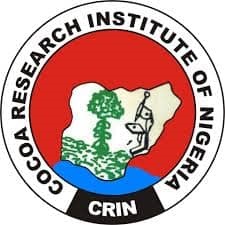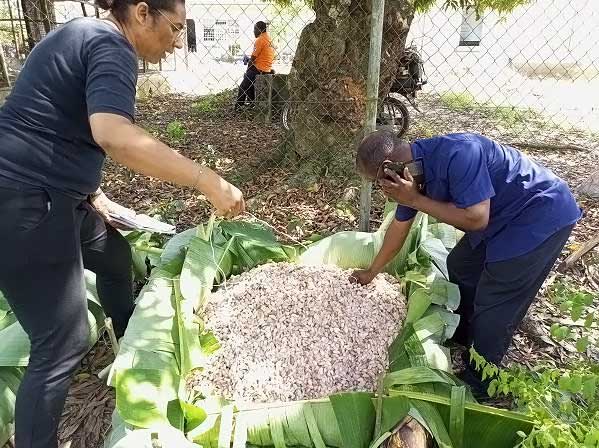The doldrums of inactivity, industrial unrest and dwindling research activities foisted on the Cocoa Research Institute of Nigeria (CRIN), by a number of factors over one decade ago is now a thing of the past; kudos to the positive radiation of the ED, Dr. Patrick Adebola. Prior to his assumption of office, various administrations of the institute have been distracted by internal industrial unrests, agitations amid dwindling research culture and poor funding, and this as in no small measure reflects on the cocoa productivity in the country. At the moment, internal industrial crises and de-motivation have been overcome as the administration of Dr. Adebola has adopted some collaborative strategies since assumption of office which undoubtedly would affect the value chain of CRIN mandate crops positively.
In the last two years, CRIN has collaborated with more stakeholders on skill acquisition and knowledge transfer, especially on grafting, fermentation, drying platforms, packaging and farm maintenance, among others. These assuredly will impact on quality and quantity of cocoa produced in Nigeria and minimise rejection in the global market. The institute has partnered with the Nigerian Export Promotion Council (NEPC) to train farmers to produce cashew juice at Yaku Village, in Ogbomoso, Oyo State.
Also, a workshop on cocoa, in collaboration with the South-South Region of NEPC, was organised for farmers and extension workers in Bayelsa State, in Yenagoa and 50 participants were trained. Additionally, CRIN interactions with NEPC yielded a N50 million grant geared towards supporting the production of cash crops, particularly cocoa and cashew. In executing the terms of the award, the institute embarked on capacity building of the stakeholders at Ogbomoso and Kabba in Kogi State; other component of the grant was the establishment of a polyclonal seed garden, and CRIN successfully procured two hectares of land at Ilero (Oyo State) and Kabba College of Agriculture (Kogi State) for the purpose; about 1600 grafted seedlings of cashew were used.
On international collaboration, CRIN and German Industry and Commerce in Nigeria (DGIC) have partnered on cashew education and training project following the establishment of the dual vocational education system, an approach which offers an excellent skills development in Germany education system, which seeks to provide a platform for stakeholders to strengthen market for vocational education and training (VET) in Nigeria. Endorsement of the Letter of Intent by the ED, Dr. Patrick Adebola and Head of DGIC Katharina Felgenhauer
Similar partnership was extended to the Agro-processing, Productivity Enhancement and Livelihood Improvement Support Project (APPEALS), a World-Bank assisted project geared sustainable cashew production in Kogi East, Central and West Senatorial districts. A total of 568 cashew farmers, including youths and women, drawn from 11 clusters across eight local government areas of the state benefitted from the training.
The Institute, in collaboration with the Nigerian Export Promotion Council (NEPC), has also organized a training workshop for cocoa farmers on best agricultural practices and safe use of pesticides on cocoa. The training is in line with the efforts of the Federal Government to diversify to non-oil exports, develop better production of cocoa and its export. No fewer than 100 cocoa farmers attended the one-day training held at Cocoa Farmers’ Association of Nigeria (CFAN) building in Osogbo. The beneficiaries of the training were also urged to embrace modern methods of cultivating the crop. This will improve the productivity of the crop and enhance quality of cocoa beans they produce which would result in more income for farmers as well as the country at large.
In a similar vein, a team of CRIN Scientists were in Ogute Oke via Okpella, Edo State for a training workshop. Cocoa and cashew farmers from the 6 Local Government Areas (LGAs) – Akoko Edo LGA, Etsako West LGA, Owan West LGA, Etsako East LGA, Owan East LGA and Etsako Central LGA – making up the Edo North Senatorial District, Edo State were trained on Cocoa and Cashew Production Practices, Value Chain Analysis and the Socio-economic aspects of the two crops.
With a drive geared towards entrenching right practices among cocoa farmers in order to enhance quality cocoa flavour, a week long in-house panelist training was organized on flavour analysis and post-harvest clonal fermentation by the Institute. The resource person was Mrs Dorine Kassi, a consultant to the World Cocoa Foundation (WCF) on cocoa flavour quality training. It was a hands-on training that encompassed the harvesting of quality cocoa pods, breaking and fermentation of the beans under a natural shade, drying on raised platform and sensory analysis.
In addition to research efforts, there are several ongoing structural transformations in the Institute which cut across road construction, laboratory, conference hall, electrification, training centre, perimeter fencing, furniture and Information and Communication Technologies (ICT), among others. Indeed, within just two years of assumption of office by Dr. Patrick Adebola, his achievement has far eclipsed that of his predecessors; he is fast gravitating towards the enviable status of ‘Greatest Of All Time’ in the annals of CRIN history.


